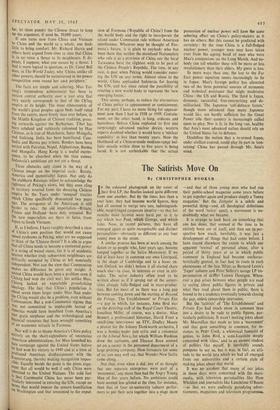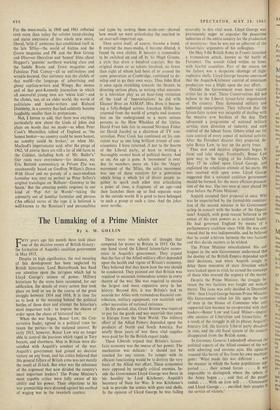The Satirists Move On
By CHRISTOPHER BOOKER
IN the coloured photograph on the cover of their first LP, the Beatles looked quite different from one another. But by the time, less than a year later, they had become world figures, they had all seemed to merge into one, indistinguish- able, mop-fringed corporate identity—so that for months most laymen were hard put to it to say which was Paul, which George, and which John. Now, in recent pictures, they have all emerged again as quite recognisable and distinct personalities—obviously as different as any four young men in the street.
A similar process has been at work among the dozen or so people who, four years ago, became lumped together as the Satire Movement. If we did at least have in common our own Liverpool, in the shape of Cambridge and to a lesser ex- tent Oxford, we didn't before it all started share much else—in class, in interests or even in atti- tudes. The satire industry often used to be written about as if it sprang out of the univer- sities already fully-fledged and in mass-produc- tion. But for most of us there was a long gap between coming down and the starting of Beyond the Fringe, 'The Establishment' or Private Eye —a gap in which, for instance, John Bird was on the directing staff of the Royal Court Theatre, Jonathan Miller, of course, was a doctor, Alan Bennett a professional historian, David Frost a small-time interviewer on ITV, Dudley Moore a pianist for the Johnny Dankworth orchestra, I was a Sunday-paper jazz critic and a columnist on the Liberal News, for which William Rushton drew the cartoons, and Eleanor Bron seemed set on a career in the personnel department of a large printing company. How fortunate for some of us, you may well say, that Wonder New Satire came along.
Not that, even when it did,-any of us thought that our separate enterprises were part of a 'movement,' any more than had the Angry Young Men of five years before. No ambitions could have seemed less related at the time, for instance, than that of four ex-university cabaret perfor- mers to put their acts together into a stage show —and that of three young men who had run their public-school magazine some years before to get together again and produce simply a 'funny magazine.' But the Zeitgeist is a subtle and powerful thing—and, all theological definitions of the word 'satire' apart, a movement is un- doubtedly what we became.
It is strange to look back on something that one has done, that seemed at the time to be entirely born out of itself, and then see in per- spective how much, inevitably, it was just a development of things that had come before. I have traced elsewhere the extent to which our apparent 'revival' of personal abuse, after a period of thirty years or so in which public comment in England had become uncharac- teristically genteel, in fact had its roots in such phenomena of the late 'fifties as Bernard Levin's 'Taper' column and Peter Sellers's savage LP im- personation of skiffier Lonnie Donegan. When- ever a gap arises between what people are used to saying about public figures in private and what they read about them in public, there is bound to be a tendency eventually towards closing the gap, unless censorship intervenes.
But the 'satirists' of 'The Establishment' and Private Eye had much more in common than just a desire to be rude to public figures, par- ticularly politicians. It wasn't making jokes about Mr. Macmillan that made us into a 'movement' and that gave something in common, for in- stance, to Peter Cook, a whimsical fantasist of genius, to John Bird, a semi-Leavisite deeply concerned with 'class,' and to an earnest student of politics like myself, It inevitably sounds pompous to say so, but it was, in fact, an atti- tude to the world into which we had all emerged from our universities and a certain style of making jokes about that world.
It was no accident that many of our jokes in those days were concerned with the mass- media, with television personalities like Huw Wheldon and journalists like Lunchtime O'Booze —or that we were endlessly parodying adver- tisements, magazines and television programmes.
For the mass-media in 1960 and 1961 reflected even more than today the solemn trend-chasing and status awareness of that whole new smart, liberal, `with-it' ambience that established itself in the late 'fifties—the world of bistros and the Queen magazine and PR and the Bow Group and Observer liberalism and 'honest' films about Hoggart's 'genuine' northern working class and the Saddle Room and Town magazine and Fabulous Pink Camay—all so unfrivolous and wrinkle-browed. Our currency was the cliches of that world—the language of advertising and glossy caption-writers and Wimpy Bar menus and of that post-Kennedy journalism in which all successful young men are 'whizz kids'—and the cliches, too, of an older world, the world of politicians and leader-writers and Richard Dimbleby, in a country that had suddenly become laughably smaller than its pretensions. , Not, I hasten to add, that there was anything particularly new about the kinds of jokes and plays on words that we made—as when Peter Cook's Macmillan talked of England as 'the honest broker—no country could be more honest, no country could be broker,' or when Mr. Macleod's impersonator said, after the purge of 1962, 'of course there are still a lot of old faces in the Cabinet, including both of Mr. Butler's.' Our roots were everywhere—for instance, my Eric Buttock commentary in Private Eye was unashamedly based on Geoffrey Willans's Down With Skool and no parody of a mass-medium
formulae was ever so perfect as Peter Sellers's original travelogue on 'Balham—Gateway to the South.' But the amazing public response to our kind of 'Pop Art in Words'—taking the solemnity out of familiar formulae and phrases (`An official secret of the type it is believed is well-known to the Russians') and personalities and types by turning them inside-out—showed how much we were articulating the reaction to an over-self-important age.
Then satire itself, of course, became a trend. It entered the mass-media, it became diluted, it found its own cliches. It became a commodity to be switched on and off by Sir Hugh Greene, a style that drew, a hundred copyists. But the original dozen or so talents involved, no fewer than eight of whom had been of or around the same generation at Cambridge, continued to de- velop and to go their own ways. Thus John Bird is once again stretching towards the theatre, to directing serious plays, to writing what amounts to a television play as an hour-long extension of the kind of 'improvisations' he did with Eleanor Bron on NSMAP. Miss Bron is becom- ing a fully-fledged actress. Jonathan Miller has returned from the world of armpits and trousers lost on the underground to a more serious persona as the Huw Wheldon of the 'sixties. David Frost bids fair to succeed Norman Fisher (or David Jacobs) as a chairman of TV con- versation. Peter Cook has continued on his con- sistent way as one long brilliant stream of con- sciousness. I have returned, if not to the bosom of the Liberal party, at least to writing a thoroughly earnest book of political theory. And so on. An age is gone. A 'movement' is over. But its members move on. Like the 'Angry' movement of the 'fifties, the satire movement was one of those catalysts for a generation which bring a whole lot of divers people to- gether to spark each other into articulating a point of time, a fragment of an age—and then launches them up to find separate ways in the outside world. It is good to have belonged to such a group at such a time. And the jokes were terrific.



































 Previous page
Previous page